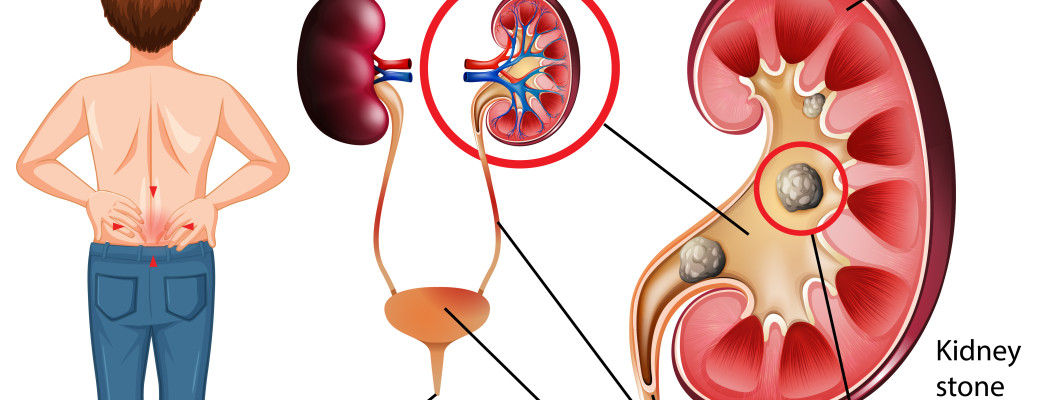
Two small
organs about the size of a fist are the kidneys. They are located behind the
abdomen on the opposite side of the spine cord. They are responsible for
flushing out toxins in the blood through urine. Since prehistoric times, kidney
stones have been mentioned as a medical condition.
This
extremely painful condition is more common in men than in women. It is most
common in those who live in developed countries.
When urine
becomes too concentrated, it can lead to kidney stones and calculi. They can form
anywhere in the urinary tract, causing pain, obstruction or secondary
infection. Experts believe that kidney stones have been more common in recent
years due to changes in lifestyles and diets.
What causes kidney stones?
When urine
becomes too concentrated, kidney stones can form. Some substances, such as
calcium, oxalate and uric acid, can leave small crystals or residues in the
kidneys' inner surfaces. Many people have chemicals in their urine that act as
inhibitors to prevent the formation of kidney stones. These inhibitors don't
work in all people, and can lead to the formation of stone in their bodies.
The formation of kidney stones can be caused by many factors. Our daily diet contains the chemicals that cause kidney stones like calcium. Many researchers believe diet can only influence someone who is already susceptible to the condition. Other common causes of kidney stone are infection and obstructions of your urinary tract. Below are some of the most common causes.
People from different parts of the globe may see the same type of stones due to their diets.
Excessive sweating and hot climates can lead to depletion in body fluids. This can lead to high levels of urine, precipitation, and stone formation.
Some pathological conditions can also be associated with the formation of urinary and renal stones. Phosphate stones can be formed if the urinary tract is obstructed or infected.
Persons with kidney stones in their family are more likely to get the condition.
Some kidney
disorders, such as polycystic kidneys increase the likelihood of developing
kidney stones.
The risk of developing stones increases with hyperparathyroidism or certain metabolic disorders.
The pH of the urine can also influence the formation of stones in your urinary tract. Calcium phosphate stones can form if the urine pH is too acidic.
Here are some signs and symptoms of kidney stone.
Fluctuating pain is the most common symptom. This can be very painful. Asymptomatic renal stones, especially phosphate stones are often'silent' unless there is an infection or obstruction. Most cases of blocked urine flow are accompanied by back pain, or pain along the sides just below the ribs.
Patients complain of dull, constant, and persistent pain in their loins or around the kidneys. This is often exacerbated by movement, but gets better when they rest. If the stone is lodged in the bladder, severe pain can occur. The pain may radiate to the labium, testis, flanks or testis and can become more severe over time.
These are other symptoms:
Sometimes, pain can be felt in the form of profuse sweating or pallor.
Nausea and vomiting
Fevers and chills
Ureter with blood tinged or cloudy color
Foul-smelling urine
Urinary urges are constant
Recurrent urinary infections.
Homeopathy and Kidney Stones
Homeopathy provides symptomatic relief, without the need to undergo surgery.
Homeopathic remedies can be prescribed based on symptoms of the patient. Different symptoms can be displayed by different people with the same disease. Sometimes, kidney stones may not be associated with certain symptoms.
To make it easier to identify the most effective remedies for a specific condition, symptoms that have been experienced by patients in the past are listed together in the homeopathic repertoire. The most common symptoms experienced by kidney stone patients are listed, along with the most frequently used medications that could ease them.
Homeopathic
remedies that can be used to treat renal stones
Below are some of the most popular remedies for kidney stones.
Aconite-Useful during the acute stage. Urine is hot and dry. Sometimes, urine is bloody. Patient perspires profusely. Lying on the painful side can worsen complaints.Urine containing arnica-dark brick colored sediment. Urination pains.
Belladonna is a useful remedy for urine that is dark, cloudy, or containing a lot of phosphate stones. It is also helpful when the area over the bladder is sensitive. It is also used to treat blood in urine.
Berberis vulgaris is used to treat patients with a sensation of urine remaining after urination or those whose urine is contaminated with mucus and sediments. It is also used to treat a bubbling sensation in the kidneys, pain in the thighs and loins during urination, and marked soreness of the lumbar region. Pain radiating to the groin
Calcarea carbonicum-Used for dark brown urine. Urine often has white sediments or is bloody.
Cantharis-This remedy is for symptoms that are intense and sudden. This remedy is known for its ability to cause burning. The entire urinary system appears to be inflamed. It is possible to desire to urinate while you are defecating.
Colo cynthus - Intense burning along the urethra after patient passes stool. Urine crystals that stick to vessels are hard reddish-colored. All over the abdomen, pain radiates from urinating. You can relieve pain by bending forward.
Nitric acid-Used to treat renal colic, where the pain can be compared to that of splinters. Urine is dark, sour and irritable. Urine is usually strong-smelling and reminiscent of horse urine. Sometimes urine can be opaque.
Lycopodium-Primarily effective in treating right-sided complaints. The patient is emaciated from the top downwards. These symptoms seem to be particularly severe between 4-8 P.M. Many symptoms can indicate a pathology in your kidneys. In acute circumstances, red sand can be found in large quantities in the urine. It is used to retain urine.
Sarsaparilla-A very good remedy for renal colic. The urine is often sluty, sandy and sometimes blood-tinged. Sitting, urine dribbles. This remedy can treat renal colic in children. The child screams in pain prior to urinating. There is also sand in their diapers. The pain radiates from the right kidney to the flanks.
Conclusion
We live in a
world where quick fixes are commonplace. However, many people are now exploring
complementary medicine. Homeopathy is a holistic approach to treating the root
cause of any disease. This system of medicine is affordable and provides
individual treatment.

Leave a Comment